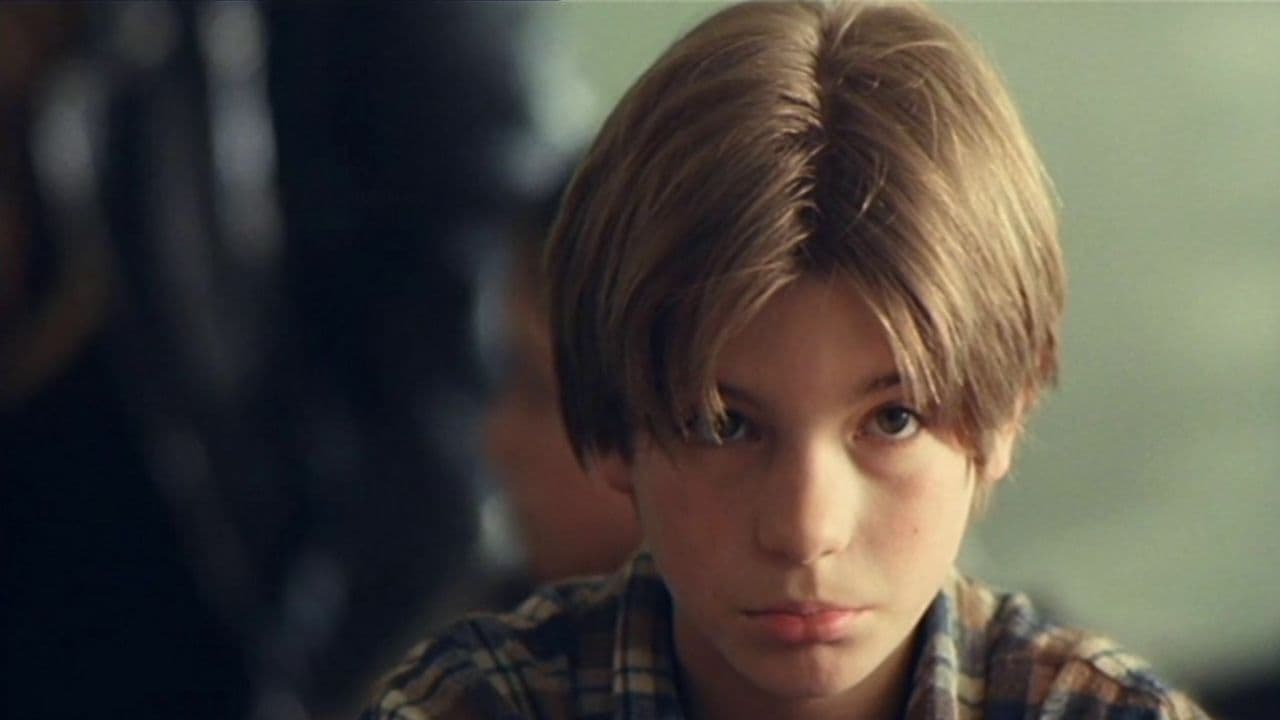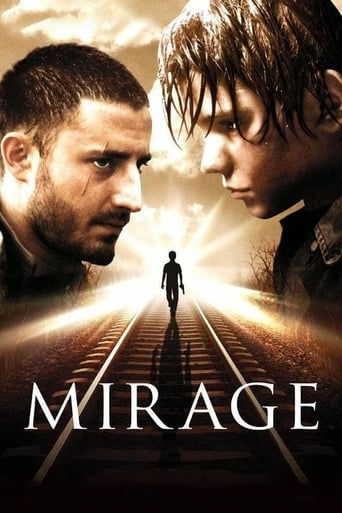BoardChiri
Bad Acting and worse Bad Screenplay
AshUnow
This is a small, humorous movie in some ways, but it has a huge heart. What a nice experience.
Lidia Draper
Great example of an old-fashioned, pure-at-heart escapist event movie that doesn't pretend to be anything that it's not and has boat loads of fun being its own ludicrous self.
Phillipa
Strong acting helps the film overcome an uncertain premise and create characters that hold our attention absolutely.
KobusAdAstra
A Nietzsche aphorism at the beginning of the film gives a good indication what to expect in this sombre film: "Hope is the worst of evils, for it prolongs the torments of man".The backdrop of this film is the Macedonian town of Veles, still recovering from the ravages of civil war. Peacekeeping soldiers and armoured vehicles are very visible. Marko is not a happy lad. His father is a drunkard and spends more time with his buddies drinking and playing bingo than at home, his slutty sister is a vicious bully, while his mother is intimidated into silence by her patriarchal husband and abusive daughter. And this is not the end of Marko's problems; at school he is is bullied by fellow students, some from influential families. The only one on his side seems to be his Macedonian language teacher, who, incidentally, originates from Bosnia. He encourages Marko, a smart lad, to take part in a poem- writing competition, the first prize being a trip to Paris. Marko does not waste time, and starts straight away. Conditions at home are just not conducive for creative writing, and after some unpleasant domestic violence, he starts spending time in an old carriage in a train graveyard close to home. One day on his way home from school, Marko once again gets physically assaulted by the bullying thugs from his class, when his language teacher, who Marko thought was on his side, came cycling up, saw what was happening, turned around and quickly cycled away. One can't blame Marko for feeling very alone with nobody on his side. Then one day he meets a drifter, ironically called Paris, who also moves into Marko's disused train carriage. Paris would teach Marko to stand up for himself, and look after his own interests, even if it means stealing. Eat or be eaten, he says. Under the influence of his new buddy, Paris, Marko becomes more rebellious and even has a few scrapes with the law. It looks like Marko's life, once promising, is now going in totally the wrong direction…This tense, tragic drama to a large extent shares themes with 'Joe, the King' (1999), Luis Buñuel's outstanding 'Los Olvidados' (aka 'The Young and the Damned') (1950), and the superb 'The 400 Blows' (aka 'Les Quatre Cents Coups') (1959) by François Truffaut, and compares quite well with them. Although I must add, the latter two films are in a class of their own. I have been impressed by the imaginative cinematography displayed in'Mirage', whilst the character of the young protagonist was made believable through the true to life performance of Marko Kovacevic. The set is excellent too, with Veles, the smallish Macedonian town, as backdrop. I gladly recommend this film. 8/10.
wrlang
Mirage is about a young boy named Marko who has some writing talents that lives in Macedonia during the wars. He is constantly being beaten by his sister or the local bullies at school. His mother is totally subservient to everyone in the household, and his father is a drunk on strike against the business where he was employed. They are poor by American standards. His peaceful place is hijacked by an ex-military guy of some kind that briefly enters Marko's life and teaches him how to shoot a gun. He also teaches Marko that there is no hope. Marko takes this lesson to heart and acts accordingly. This is a very well made film, but extremely depressing in that a feeling and talented child is totally mishandled by the adults around him.
nycritic
No one can call Nietzche from being someone who spawned cheerful, optimistic blurbs about the condition of Man and His position in the Universe. So the moment a film decides to use one of his more depressing quotes -- "Hope is the worst of evils, for it prolongs the torment of man." -- it was clear to me that this was not going to be a walk in the park, but an express ride into hell with no way back up.Macedonia produces this cinematic denouncement of a film and while it's too negative to be recommended, it's not a film anyone can ignore, or watch without feeling something wrenching at the stomach. The story of Marko, the little boy who lives in a country ravaged by civil unrest and the threat of a civil war just seconds away from happening, makes for an important voice even when the writers have given him none.Marko is in the middle of the death of his family as a unit. His father is a deadbeat drunk who plays the lotto and hopes to win. His mother moves about in a haze and his sister gives him an excruciating amount of abuse for the hell of it. School is no better: there is Levi, the school thug who leads a gang, who has decided to focus his anger on him. And a teacher, originally from Bosnia (considered sacrilegious of in this country) who sees hope in Marko's sensitive writing and thinks his poetry might be the express way out of this hell, into the promise of Paris.Paris indeed arrives, in a moment of hope, as a young mercenary of sorts -- a man who has lived a dangerous life. As Marko retreats from his daily dose of abuse into an abandoned train, he meets and befriends this man who comes to teach Marko two things: that life is hopeless and a constant battle, and to eat or be eaten (the movie's tagline). As the mental and physical violence around and directed at Marko escalates and even those who had hope in him decide to turn the other face as the ones in power (Levi and his police father) gain so much control that it seems all roads of escape end at their feet, Marko takes a drastic action into his own hands.This kind of story is not new. I think the director is trying to, in telling a story of the loss of hope, an allegory about how innocence -- the future (Marko) -- can take so much before crying out and lashing at those who try to help but cannot (Marko's teacher, who didn't even assist him when Levi and his gang beat him up at his doorstep but fled the scene). I did wonder if the introduction of Paris and Marko's transformation from golden haired boy into a killing machine was a foreshadowing of what Marko would become -- since he walks away from it all right at the end while no one even flinches to see what took place. Paris, the soldier, has told Marko not to expect anything from anyone, that the only way of leaving a bad situation is leaving, not hoping, and this is exactly what Marko in the end is implied as doing.MIRAGE is not an easy movie. At times I felt, as an American used to some form of catharsis that would in one way rescue the abused character and give him the victory over evil, that this systematic abuse was too much. It set me up for a false sense of "hope" once Marko starts taking subtle control over his life and even put down his sister in one funny scene. The only thing I can infer is that MIRAGE reflects the reality of many victims of society who have no one to help them, who have been pushed so far and then beyond the edge until they embrace the darkness of life. I kept getting slight references to a Mexican film by Luis Bunuel -- LOS OLVIDADOS in which innocence was also stolen and turned into something ugly. MIRAGE, however its pessimism (which is hard to take), has its beauty, even when it's one which should approached to with caution.
oksimoroni
i've seen this movie recently, on Belgrade Film Festival (FEST), and i was delighted. although nobody expected it (numerous movies were shown on FEST, from across the world, some of them hailed by film critics - like "Vera Drake", directed by Mike Leigh), "Iluzija" was the best film shown of festival, and not only because of the "clever metaphors", or actors performances (although both of this elements are excellently controlled), but because of straight, concentrated, well-narrated story, with clear and precise beginning-middle-end structure, and with lots of details that are creating dangerous and mean universe (picture of Balkan under NATO "protectors") of the movie. of course, viewer who knows facts about Macedonia-Balkan-ex-Yugoslavia can see some of the best artistic comments on reality of the countries in so-called "transition", and also political-incorrectness (if you consider the critic of EU-USA attitude on "small countries" to be uncorrected). and when you are thinking about the movie in-whole, you can realize why's there a Nietzsche quotation on the movies beginning. but, there's a lot of philosophy in it, so we are leaving that story for another time, and another place...

